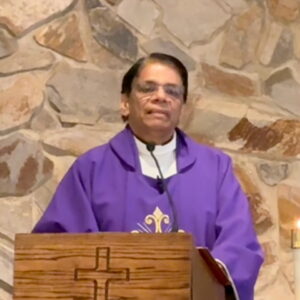In today’s First Reading, God forgives “the reproach” of the generations who grumbled against Him after the Exodus. On the threshold of the promised land, Israel can, with a clean heart, celebrate the Passover, the feast of God’s firstborn son. Reconciliation is also at the heart of the story Jesus tells in today’s Gospel. The story of the Prodigal Son is the story of Israel and of the human race. But it is also the story of every believer.
In Baptism, we’re given a divine birthright, made “a new creation,” as Paul puts it in today’s Epistle. But when we sin, we’re like the Prodigal Son, quitting our Father’s house, squandering our inheritance in trying to live without Him. Lost in sin, we cut ourselves off from the grace of sonship lavished upon us in Baptism. It is still possible for us to come to our senses and make our way back to the Father as the prodigal does, but only He can remove the reproach and restore the divine sonship we have spurned. Only He can free us from our slavery to sin. God wants not slaves but children. Like the father in today’s Gospel, He longs to call each of us “My son,” to share His life with us, to tell us: “Everything I have is yours.”
The Father’s words of longing and compassion still come to His prodigal children in the Sacrament of Penance. This is part of what Paul today calls “the ministry of reconciliation” entrusted by Jesus to the Apostles and the Church.
The pain of separation can only be surpassed by the joy of the homecoming and reunion. When God commanded his people to celebrate the Passover annually, he wanted them never to forget what he did for them when he freed them from oppression and slavery in the land of Egypt and brought them back to their promised homeland, which he gave as a sign of his immense love and favor. At the end of their wandering in the wilderness for 40 years, Joshua, the successor to Moses, led the people in celebrating the Passover meal after they had safely passed over the River Jordan to their promised homeland.
This crossing over from a land of slavery and oppression to a land of promise and freedom foreshadows the true freedom and homecoming which the Lord Jesus has won for us in his kingdom. Through his victory on the cross the Lord Jesus has delivered us from the dominion of sin and darkness and transferred us to his kingdom of light, truth, and forgiveness. God offers this freedom to all who believe in his Son. God does not desire the death of anyone. That is why he sent us his only begotten Son to set us free from slavery to sin, Satan, and death, and to restore us to everlasting peace, joy, and abundant life with our Father in heaven. In this parable Jesus gives a vivid picture of God and what God is like. God is truly kinder than any of us. He does not lose hope or give up when we stray from him. He is always on the lookout for those who have a change of heart and want to return. He rejoices in finding the lost and in welcoming them home. Therefore, we shall come back to Jesus as “alive.” He loves us more than anybody else in the entire universe. Thank you, Jesus for loving us this much.
Love and Prayers.
Fr. Charley
